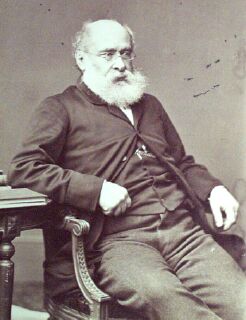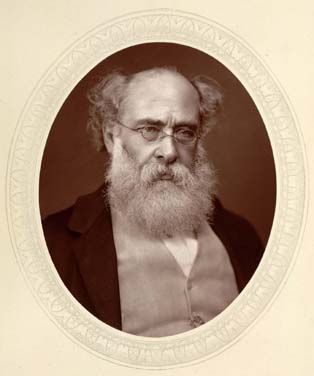Anthony Trollope
Autobiography 1883
|
  |
|
Anthony Trollope (1815-1882) wrote
this memoir of his life in the 1870s. He left it to his son with a letter
dated 30 April 1876 asking for it to be published after his death. That came
in 1882 and the biography was published late the next year. Wilkie Collins
is mentioned four times. Those extracts are reprinted below with the name
picked out in red.
Collins did not care for it. On 30 January 1884 he
wrote to his agent A P Watt
"I returned the Trollope
autobiography – thinking you might wish perhaps to lend it to other friends.
I am not worthy of the book – for I
could not read it through. The first part I thought very interesting – but
when he sits in judgment on his own novels and on other peoples’ novels he
tells me what I don’t want to know, and I bid him goodbye half way through
the journey." |
Among English novels of the present day,
and among English novelists, a great division is made. There are sensational
novels and anti-sensational, sensational novelists and anti-sensational,
sensational readers and anti-sensational. The novelists who are considered to be
anti-sensational are generally called realistic. I am realistic. My friend
Wilkie Collins is generally supposed to be
sensational. The readers who prefer the one are supposed to take delight in the
elucidation of character. Those who hold by the other are charmed by the
continuation and gradual development of a plot. All this is, I think, a
mistake,--which mistake arises from the inability of the imperfect artist to be
at the same time realistic and sensational. A good novel should be both, and
both in the highest degree. If a novel fail in either, there is a failure in
art. Let those readers who believe that they do not like sensational scenes in
novels think of some of those passages from our great novelists which have
charmed them most:--of Rebecca in the castle with Ivanhoe; of Burley in the cave
with Morton; of the mad lady tearing the veil of the expectant bride, in Jane
Eyre; of Lady Castlewood as, in her indignation, she explains to the Duke of
Hamilton Henry Esmond's right to be present at the marriage of his Grace with
Beatrix;--may I add of Lady Mason, as she makes her confession at the feet of
Sir Peregrine Orme? Will any one say that the authors of these passages have
sinned in being over-sensational? No doubt, a string of horrible incidents,
bound together without truth in detail, and told as affecting personages without
character,--wooden blocks, who cannot make themselves known to the reader as men
and women, does not instruct or amuse, or even fill the mind with awe. Horrors
heaped upon horrors, and which are horrors only in themselves, and not as
touching any recognised and known person, are not tragic, and soon cease even to
horrify. And such would-be tragic elements of a story may be increased without
end, and without difficulty. I may tell you of a woman murdered,--murdered in
the same street with you, in the next house,--that she was a wife murdered by
her husband,--a bride not yet a week a wife. I may add to it for ever. I may say
that the murderer roasted her alive. There is no end to it. I may declare that a
former wife was treated with equal barbarity; and may assert that, as the
murderer was led away to execution, he declared his only sorrow, his only regret
to be, that he could not live to treat a third wife after the same fashion.
There is nothing so easy as the creation and the cumulation of fearful incidents
after this fashion. If such creation and cumulation be the beginning and the end
of the novelist's work,--and novels have been written which seem to be without
other attractions,--nothing can be more dull or more useless. But not on that
account are we averse to tragedy in prose fiction. As in poetry, so in prose,
he who can deal adequately with tragic elements is a greater artist and reaches
a higher aim than the writer whose efforts never carry him above the mild walks
of everyday life. The Bride of Lammermoor is a tragedy throughout, in spite of
its comic elements. The life of Lady Castlewood, of whom I have spoken, is a
tragedy. Rochester's wretched thraldom to his mad wife, in Jane Eyre, is a
tragedy. But these stories charm us not simply because they are tragic, but
because we feel that men and women with flesh and blood, creatures with whom we
can sympathise, are struggling amidst their woes. It all lies in that. No novel
is anything, for the purposes either of comedy or tragedy, unless the reader can
sympathise with the characters whose names he finds upon the pages. Let an
author so tell his tale as to touch his reader's heart and draw his tears, and
he has, so far, done his work well. Truth let there be,--truth of description,
truth of character, human truth as to men and women. If there be such truth, I
do not know that a novel can be too sensational.
….
In his plots Bulwer has generally been
simple, facile, and successful. The reader never feels with him, as he does with
Wilkie Collins, that it is all plot, or, as with
George Eliot, that there is no plot.
….
Of Wilkie Collins
it is impossible for a true critic not to speak with admiration, because he has
excelled all his contemporaries in a certain most difficult branch of his art;
but as it is a branch which I have not myself at all cultivated, it is not
unnatural that his work should be very much lost upon me individually. When I
sit down to write a novel I do not at all know, and I do not very much care, how
it is to end. Wilkie Collins seems so to construct his that he not only, before
writing, plans everything on, down to the minutest detail, from the beginning to
the end; but then plots it all back again, to see that there is no piece of
necessary dove-tailing which does not dove-tail with absolute accuracy. The
construction is most minute and most wonderful. But I can never lose the taste
of the construction. The author seems always to be warning me to remember that
something happened at exactly half-past two o'clock on Tuesday morning; or that
a woman disappeared from the road just fifteen yards beyond the fourth
mile-stone. One is constrained by mysteries and hemmed in by difficulties,
knowing, however, that the mysteries will be made clear, and the difficulties
overcome at the end of the third volume. Such work gives me no pleasure. I am,
however, quite prepared to acknowledge that the want of pleasure comes from
fault of my intellect.
….
But The Eustace Diamonds achieved the
success which it certainly did attain, not as a love-story, but as a record of a
cunning little woman of pseudo-fashion, to whom, in her cunning, there came a
series of adventures, unpleasant enough in themselves, but pleasant to the
reader. As I wrote the book, the idea constantly presented itself to me that
Lizzie Eustace was but a second Becky Sharpe; but in planning the character I
had not thought of this, and I believe that Lizzie would have been just as she
is though Becky Sharpe had never been described. The plot of the diamond
necklace is, I think, well arranged, though it produced itself without any
forethought. I had no idea of setting thieves after the bauble till I had got my
heroine to bed in the inn at Carlisle; nor of the disappointment of the thieves,
till Lizzie had been wakened in the morning with the news that her door had been
broken open. All these things, and many more, Wilkie
Collins would have arranged before with infinite labour, preparing things
present so that they should fit in with things to come. I have gone on the very
much easier plan of making everything as it comes fit in with what has gone
before. At any rate, the book was a success, and did much to repair the injury
which I felt had come to my reputation in the novel-market by the works of the
last few years. I doubt whether I had written anything so successful as The
Eustace Diamonds. since The Small House at Allington. I had written what was
much better,--as, for instance, Phineas Finn and Nina Balatka; but that is by no
means the same thing.
From The Autobiography of Anthony
Trollope 1883.
go back to biographies list
go back to Wilkie Collins front page
visit the Paul Lewis front page
All material on these pages is © Paul Lewis 1997-2007

